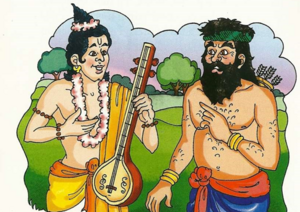Talk:Sharing and Transference of Karmaphala between Individuals/Groups:No Transfer of Karm Possible
By Vishal Agarwal
The first view states that there is an exact correspondence between the doer and the reaper, even if the two are separated by lifetimes. The phenomenon of rebirth is a corollary to the law of karm. Therefore, if one does not reap the fruit of his deeds in this lifetime, he will reap them in a future lifetime. No karm can be transferred from oneself to another.
Just as a calf recognizes his own mother from among thousands of cows, likewise the deeds performed earlier locate their correct doer at a later time. Mahābhārata 12.181.16
Bhagavān Śiva said to Devī Pārvatī – Whatever deed one performs, that very fruit he obtains (i.e., the fruit or results are consistent with the deed performed). The jīva reaps the fruit of his own karm. No one else is entitled to the fruit of the karm of another. Mahābhārata 13, chapter 145 (Southern recension)
No one takes the good and bad fruit of anyone else’s virtuous and evil karm. In fact, everyone reaps the fruit of his own karm. Mahābhārata 12.280.2
Man is born alone; man dies alone; he enjoys his merits by himself; he reaps the bitter fruits of his sins by himself. Garuḍa Purāṇa 2.12.22
In this view, no transfer of karm takes place even between family members and generations within the same family. Every individual has his own personal, individual and separate stock of the fruit of karm that they alone have performed in previous lives or earlier in the present life.
There is no connection between the deeds of a father and his son, or the deeds of the son and his father. Bound by his own karm, each individual treads his own path, and reaps the fruit of his own karm.' Mahābhārata 12.153.38
This point needs emphasis because one often does virtuous or evil deeds for the sake of his family members, friends or other loved ones. But in this viewpoint, even if evil karm is done for the sake of others, the doer alone reaps the fruit and never those for whose sake it was done.
For the sake of one’s wife and children, one does several evil deeds and incurs evil result. But one has to suffer the results of his karm alone, whether in this world or in the next. Mahābhārata 12.174.25
In this connection, we read of the story of Maharṣi Vālmīki and his transition from a highway robber to an esteemed ṛṣi and author of the Śāstras, the Rāmāyaṇa.
Story: How the Dacoit Ratnākara became a Ṛṣi
Ṛṣi Vālmīki is called the Ādi Kavi or the first poet in the Sanskrit language. He composed the Rāmāyaṇa – the story of the life of Bhagavān Rāma – in 24,000 verses. The Rāmāyaṇa has become so influential that even outside Bhāratavarṣa, countries like Indonesia, Thailand, Burma, Laos, Malaysia, China, and Japan have developed their own versions based on Ṛṣi Vālmīki’s original epic.
Thousands of years ago, a dacoit named Ratnākara (also called Valya Koli) lived in the forests of North India. He earned his livelihood by robbing and killing travelers who passed through the jungle. He would steal their belongings and food to feed his wife and children.
One day, Sage Nārada was passing through the forest. Suddenly, Valya emerged from behind a bush and threatened to kill Nārada unless he gave up his possessions. Nārada calmly asked Valya why he was living such a life of crime. “To feed my family,” replied Valya. Nārada then questioned him further: “Don’t you know that it is a great adharm to kill and steal from others? You will incur pāpa (negative karm) and suffer its fruits later. Will your family also share this bad karm with you, just as they share your loot?”
Valya paused and said, “Let me go and ask them.” But when he questioned his wife and children, they replied, “It is your duty to care for us and feed us, but we will not share in your pāpa. That is yours alone.” Hearing this, Valya was devastated. The very family for whom he had committed so many wrongs refused to share in the consequences. He realized that every individual bears the fruits of their own karm, whether good or bad.
Heartbroken and remorseful, Valya returned to Nārada and asked, “How can I make amends for my sins and become a good person?” Sage Nārada advised him to meditate and chant the name of Rāma continuously until he returned.
Valya obeyed and began chanting Rāma-Rāma with full sincerity. He sat unmoved for years, and over time, white ants built an anthill (called a vālmīki) around his body, completely covering him. Due to this, he came to be known as Vālmīki.
Eventually, a Divine voice declared that Īśvara was pleased with his devotion, and he could emerge. Sage Nārada appeared and confirmed that Valya had now become a purified being. Nārada briefly narrated the story of Bhagavān Rāma, then the King of Ayodhyā.
In time, Vālmīki became a great ṛṣi and poet. He composed the Rāmāyaṇa—an epic glorifying the noble character of Bhagavān Rāma. The Rāmāyaṇa has since inspired countless generations and remains one of the most read and respected scriptures in the world. It continues to teach people the values of satya (truth), dharm (righteous conduct), karuṇā (compassion), and śaurya (heroism) so that they may lead lives of moral excellence.

